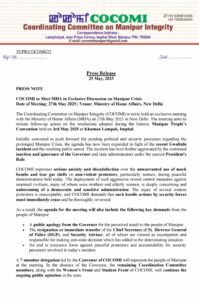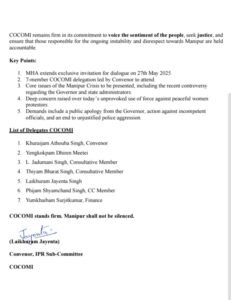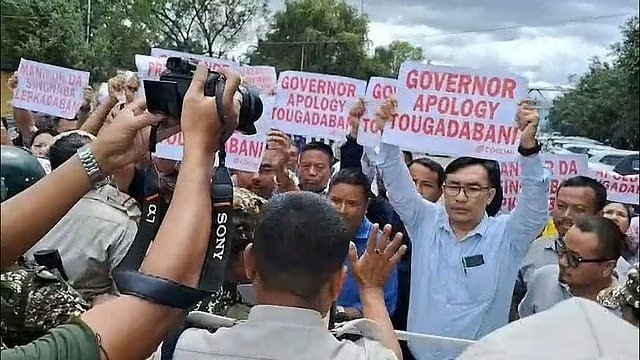Violent clashes broke out in Imphal as women-led protests turned tense over the Gwaltabi incident. Tear gas and mock bombs injured seven, deepening outrage against the Governor and Presidential Rule.
BY PC Bureau
Imphal, the capital of Manipur, witnessed chaos on Sunday, May 25, 2025, as thousands of protesters—primarily women—marched towards the Raj Bhavan, the Governor’s official residence. The protests, organized by the Coordinating Committee on Manipur Integrity (COCOMI), were triggered by a controversy during the Shirui Lily Festival 2025 in Ukhrul, where personnel from the Maha Regiment allegedly forced the concealment of the word “Manipur” on government-run MST buses. COCOMI and the protestors saw this act as a grave insult to Manipur’s identity and condemned the silence of Governor Ajay Kumar Bhalla and the Presidential Rule (PR) administration.
The situation escalated when security forces, including the Rapid Action Force (RAF), fired tear gas and mock bombs to disperse the crowd, injuring at least seven women.
This report outlines the protest, its causes, the response by security forces, COCOMI’s demands, and the broader political and ethnic tensions in Manipur.
READ: L’Affair Tej Pratap Yadav: Love, Loyalty, or Sibling Rivalry?
Background and Context
Since May 3, 2023, Manipur has been engulfed in ethnic violence primarily between the majority Meitei community and the Kuki-Zo tribal groups. The conflict has resulted in significant loss of life, mass displacement, and widespread mistrust. The imposition of Presidential Rule—prompted by the state government’s failure to manage the crisis—has further alienated large sections of the population.


COCOMI, a prominent Meitei organization, has been a leading critic of the central administration, accusing it of cultural insensitivity and administrative incompetence. The recent incident in Gwaltabi was perceived as a symbolic assault on Manipur’s identity, igniting widespread outrage.
The Incident: Protests in Imphal
On May 25, thousands gathered in Imphal demanding accountability from Governor Bhalla. Protesters, including many women, marched through the historic Kangla Fort gate to the Raj Bhavan, carrying placards demanding a public apology and the resignation of top officials, including the Chief Secretary, Director General of Police (DGP), and Security Advisor.
READ: Political Earthquake in Bihar– Lalu expels Tej Pratap
The protest turned volatile when RAF personnel intervened. Tear gas and mock bombs were used to disperse the crowd, injuring at least seven women:
- Geeta Devi (44), Singjamei
- Shanti Devi (72), Khurai
- Priya Devi (42), Wangkhei Angom Leikai
- Gyaneshori (58), Khongman
- Abe Devi (52), Patsoi
- Kh. Rajeshwori (64), Lalambung
- K. Sabitri Devi (60), Tabungkhok
COCOMI condemned the use of force on unarmed civilians, especially women, calling it “deeply concerning,” and demanded a review of current security protocols.
The Trigger: The Gwaltabi Incident
The unrest stemmed from an incident in Gwaltabi where the Maha Regiment allegedly forced Manipur journalists to cover or remove the word “Manipur” from MST buses headed to Ukhrul for the festival. COCOMI denounced this as a “deep insult” to Manipur’s identity, accusing the administration of being out of touch with public sentiment.
The Governor’s silence and the PR administration’s inaction further fueled public outrage. In response, COCOMI announced a boycott of the Governor, urging citizens and institutions to shun events involving him until he issues a formal apology.
COCOMI’s Demands
COCOMI laid out five key demands:
- Public Apology: Governor Bhalla must issue a formal apology for the perceived insult to Manipur’s identity.
- Removal of Officials: Immediate resignation or transfer of the Chief Secretary, DGP, and Security Advisor, who are accused of making “anti-state decisions.”
- Independent Inquiry: Formation of an independent committee led by a retired High Court or Sessions judge to investigate the Gwaltabi incident.
- Clarification: A public explanation by the Governor regarding the Gwaltabi incident and its handling.
- Security Review: An overhaul of security protocols to prevent the excessive use of force on civilians.
Mobilization and Civil Disobedience
On May 24, COCOMI announced state-wide protests—rallies, torch processions, and sit-ins—urging peaceful civil disobedience against the PR administration. While essential services like education, healthcare, banks, postal services, and sports were exempted, COCOMI encouraged non-cooperation with central offices.
A seven-member COCOMI delegation will travel to Delhi on May 26 to meet Home Ministry officials on May 27, aiming to press for action on the Gwaltabi incident and broader administrative grievances. The visit builds on resolutions from the Manipur People’s Convention held on May 3, 2025, marking two years since the outbreak of ethnic violence.
The May 25 protests are emblematic of deeper frustrations over Manipur’s governance under Presidential Rule and the ongoing ethnic divide. The Gwaltabi incident, though small in scope, has become a potent symbol of disrespect and marginalization. The use of force against protesters—especially elderly women—has only intensified public anger and could lead to wider unrest if not urgently addressed.














